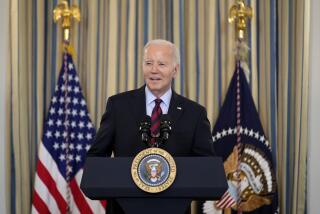Romney’s shifting focus defies tested campaign strategy
BOSTON — When he began his campaign for president last year, Mitt Romney made a clear case for what he said made him best qualified for the job: His record as Massachusetts governor, head of the 2002 Winter Olympics and, above all, the businessman who founded Bain Capital.
To create jobs in the private sector, he argued for months, it takes experience in the private sector.
“We invested in over 100 different businesses, and net-net — taking out the ones where we lost jobs and those that we added — those businesses have now added over 100,000 jobs,” Romney said of his Boston firm in January.
More recently, hit with brutal Democratic advertising on his Bain takeover deals, Romney has all but dropped his argument that his history of creating jobs made him better suited than President Obama to fix the economy.
What he once portrayed as a proud achievement, he now rarely mentions, lest he remind voters of plant layoffs that other Bain investments yielded.
Instead, Romney has zigzagged in recent weeks from one message to another, defying a widely observed rule of successful campaigns: Pick a theme and stick with it.
Over the last few weeks, welfare, Medicare and Romney’s tax returns have dominated various news cycles as he lost his focus on trying to tear down the president’s record on the economy. Romney’s television advertising has also veered away from job creation, instead using welfare and Medicare to attack Obama.
At a rally last week in Ohio, Romney also abandoned his stump speech, replacing it with a scathing rhetorical indictment of Obama for stoking “division and anger and hate.”
“His campaign and his surrogates have made wild and reckless accusations that disgrace the office of the presidency,” Romney told supporters in Chillicothe, singling out Vice President Joe Biden for telling a racially mixed crowd that Obama’s opponent was going to “put y’all back in chains.”
A party’s presumptive presidential nominee would typically deliver variations of a new speech in one battleground state after another in the days leading up to its national convention, which for the Republicans opens next Monday. But Romney, facing pressure to raise money, dropped off the campaign trail last week and headed to a series of fundraising events at golf clubs and private estates in Alabama, South Carolina, New York, Massachusetts and other states that are not seen as up for grabs in November.
His mingling with NASCAR team owners and other wealthy donors made for an awkward counterpoint to a flurry of Obama campaigning in swing states, where the president accused his rival of favoring the rich over the middle class.
In the end, Romney’s shifting focus could prove insignificant. Polls have consistently found that voters see him as a better fit than Obama to revive America’s economy. Also weighing heavily on Obama’s bid for a second term is the unpopular healthcare overhaul that Romney has been attacking hard in the back-and-forth over Medicare.
But for now, Romney’s swerving has left some Republicans fretting that he has strayed too far from the top concern of voters.
“The key thing here is the entire country wants to talk about jobs and the economy, so you stay on that message,” said Ed Rollins, a veteran Republican strategist who called welfare, in particular, a distraction.
“You basically now have 10 weeks to go here, and you just make sure every week is a reinforcement of the narrative — he’s qualified to fix the economy,” Rollins said.
Romney’s joint advertising with the Republican National Committee on welfare — it falsely accuses Obama of trying to gut 1990s reforms by dropping work requirements — appeared amid growing concern in the party over his decision to bypass biographical ads that traditionally open a challenger’s campaign.
Romney began running an ad on his personal background only after three months of withering Obama advertising that sought to define him as an out-of-touch plutocrat. Both campaigns, along with “super PACs,” have been dumping tens of millions of dollars into TV advertising in Florida, Ohio and other swing states.
Romney’s chief strategist, Stuart Stevens, disputed the idea that the Republican candidate was skipping from one topic to another with no coherent theme. Romney remains focused on jobs, he said, and is contrasting two fundamentally different visions of how to fix the economy.
Namely, he said, Obama believes in government solutions to society’s problems, whereas Romney does not. He said visible demonstrations of that contrast included the 2009 economic stimulus package, altered requirements for welfare recipients, and cuts in Medicare spending to, in part, finance “Obamacare” coverage for the uninsured.
“Work for welfare is an essential jobs issue,” Stevens said. “It’s an indication of an approach of a president who doesn’t understand the power of the free-enterprise system to solve problems, and that really is at the root of the differences between Mitt Romney and Barack Obama.”
Nonpartisan fact checkers have found that it was untrue Obama had eased work requirements for welfare, and that the president’s Medicare cuts applied to healthcare providers and administrators, not to patient benefits. (They have also faulted Obama’s advertising for false or exaggerated charges.)
Stu Spencer, who was a top campaign strategist for President Reagan, suggested that Romney’s main problem was that voters liked Obama more than his opponent. There remains enough time to overcome that challenge, he said, but tighter focus on a coherent campaign theme is essential.
“After the convention, you’ve got to get on a message and stay on it,” Spencer said. “He’s going to have to bring it all together in one big package.”
More to Read
Start your day right
Sign up for Essential California for news, features and recommendations from the L.A. Times and beyond in your inbox six days a week.
You may occasionally receive promotional content from the Los Angeles Times.







